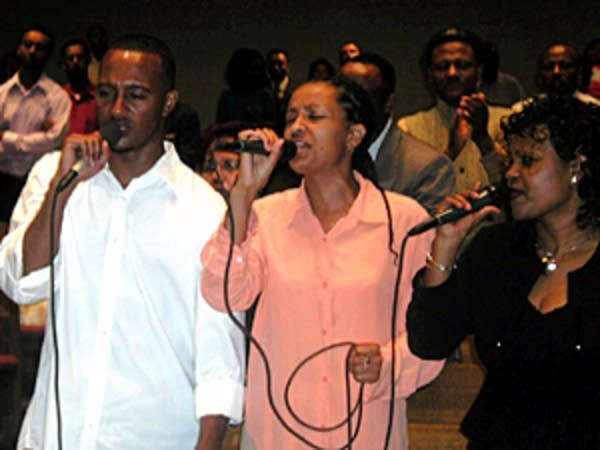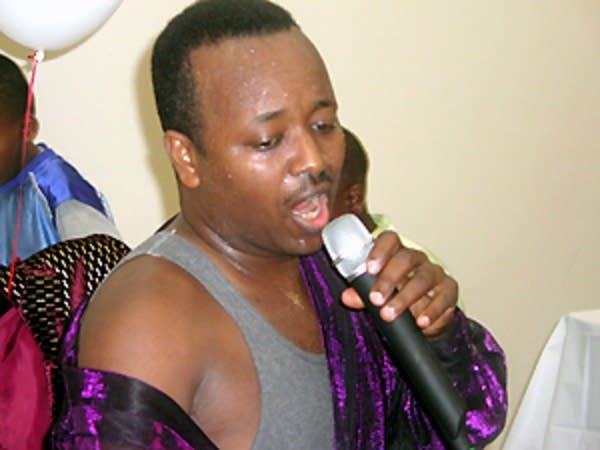The Oromo sing a joyful song
Go Deeper.
Create an account or log in to save stories.
Like this?
Thanks for liking this story! We have added it to a list of your favorite stories.

At a large Oromo wedding on the east side of St. Paul, singer Mohammed Sheka, playing his pre-programmed electronic keyboard, has dozens of revelers right where he wants them. They're hopping in unison to one of his songs, which they all seem to know.

Sheka's life is typical for many Oromo refugees. Back in Oromia, he was a popular performer with several CDs. Then, the Ethiopian government clamped down.
"I was in prison for two years in Ethiopia, because my first CD and the second -- all of my CDs -- they have a song for freedom," says Sheka.
Like many who hope Oromia will become a country in its own right, Sheka fled to Nairobi and then to Minneapolis. He now works nine hours a day doing deliveries. He sings on the side, and is recording another CD to sell back home. Ask him to describe the Oromo sound and he'll say there are many.
Turn Up Your Support
MPR News helps you turn down the noise and build shared understanding. Turn up your support for this public resource and keep trusted journalism accessible to all.

"Oromo people, we have 14 states. We have the same thing, about 14 cultural musics, a different kind of music and a different kind of rhythm," says Sheka.
And Sheka says he's comfortable in every style.
One distinctive brand of Oromo music can be heard every Sunday morning at Our Redeemer Evangelical Lutheran Church in Minneapolis.
The entire congregation is on its feet as a minister, her eyes closed and hands in the air, passionately preaches salvation.
The keyboard player begins an Oromo Lutheran hymn, and the sanctuary takes on the air of a revival. The music is bouncy and jubilant, the melodies soar. Nearly everyone is singing and swaying.

All this lively worship makes the traditional Scandinavian Lutheran service seem even more staid and subdued. Yet, Scandinavians can take some credit for Oromo faith. Eight percent of the Oromo are Protestants because of the influence of Scandinavian missionaries.
Allison Adrian is a budding ethnomusicologist at the Univesity of Minnesota. Adrian says the joyfulness in Oromo Lutheran music contradicts the tragic situation the Oromo find themselves in.
"We have people here worshipping whose families -- they're separated. They might not know where some of their family is in Oromia," says Adrian. "But yet, they're just so absolutely happy to be free here, to be free to use their own language, to be free to have cultural events, to be free to be Oromo here in the Twin Cities, and I think that really comes through in their music."
Traditionally, Oromo music incorporates a variety of instruments. There's the krar, which is in the lute family, a one-string fiddle called the masenqo and frame drums which are played with the hands. But there are so few skilled players in America and Canada that Oromo musicians, like their Somali counterparts, are opting for the electronic keyboard.

While the instrumentation has gotten a technological makeover, Allison Adrian says the music still expresses a yearning for home.
"A lot of themes in their music have to do with feelings about their homeland, nostalgia about Oromia, wanting to go back but not being able to," says Adrian. "I feel like that kind of unifies Oromo music across styles and genres."
Adrian says Oromo Lutherans aren't necessarily evangelical Christians, but they are trying to set an example.
"Some of them feel as if they're here to show a lot of Americans their faith."
Adrian says upon arriving in the U.S., many of the Oromo expected to find a devoutly Christian nation. When they saw that wasn't the case, Adrian says some decided it was their calling to make Americans understand how lucky they are to speak their own language, live in relative safety and express their own faith.
Dear reader,
Your voice matters. And we want to hear it.
Will you help shape the future of Minnesota Public Radio by taking our short Listener Survey?
It only takes a few minutes, and your input helps us serve you better—whether it’s news, culture, or the conversations that matter most to Minnesotans.






